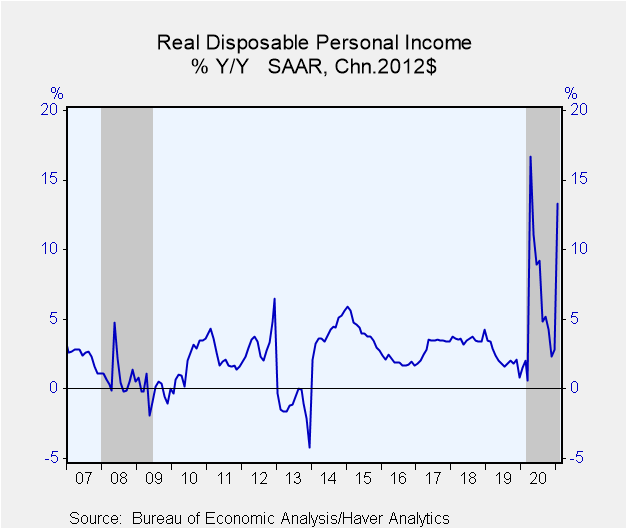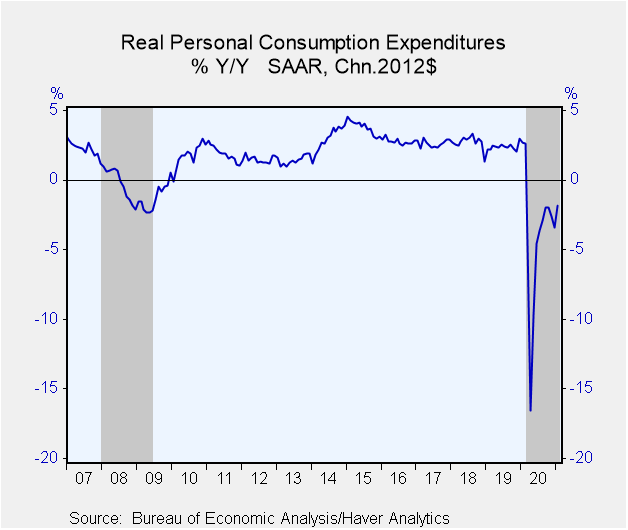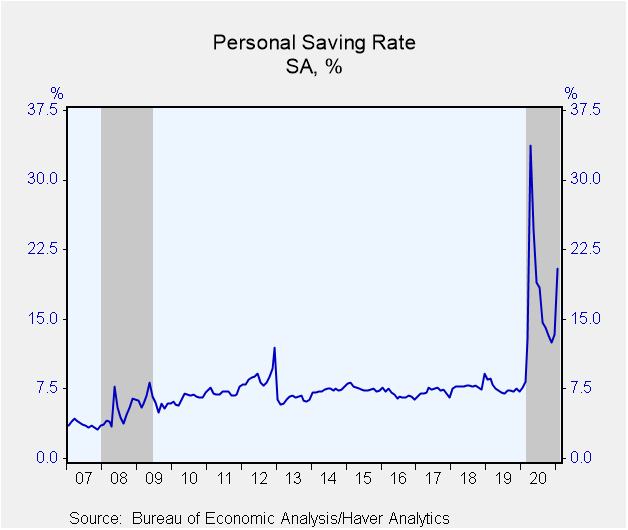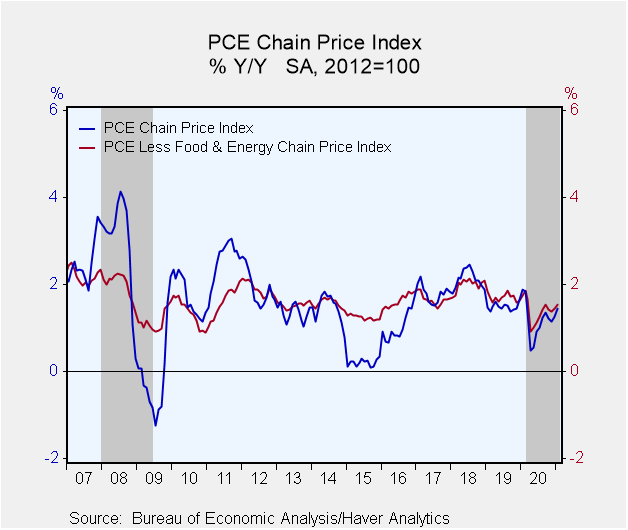 Global| Feb 26 2021
Global| Feb 26 2021U.S. Personal Income & Spending Surge With Stimulus Payments in January
by:Tom Moeller
|in:Economy in Brief
Summary
• Income boosted by government payments of $600 to individuals. • Spending growth strengthens for goods & services. • Pricing power remains improved. Personal income jumped 10.0% (13.1% y/y) last month after increasing 0.6% during [...]
• Income boosted by government payments of $600 to individuals.
• Spending growth strengthens for goods & services.
• Pricing power remains improved.
Personal income jumped 10.0% (13.1% y/y) last month after increasing 0.6% during December and falling 1.2% in November, revised from -1.3%. It was the largest monthly increase since April 2020. A 9.5% gain had been expected in the Action Economics Forecast Survey. Transfer payments surged 52.0% (80.4% y/y) as the government attempted to boost consumer spending. Wages & salaries improved 0.7% (1.1% y/y) following two months of 0.5% increase. Proprietors' income declined 0.5% (-5.1% y/y) after two months of sharp decline. Rental income strengthened 1.1% (1.3% y/y) after falling for three straight months. Income from assets declined 3.0% (-4.1% y/y) as dividend income weakened 6.7% (-4.4% y/y). Adding to the total of government payments, unemployment insurance receipts rose 85.4% last month after rising 9.5% In December. Disposable personal income rose 11.4% (15.0% y/y) last month after improving 0.6% in December. Adjusted for price inflation, real disposable income rose 11.0% (13.3% y/y) after edging 0.2% higher.
Consumers spent much of what the government gave them last month. Personal consumption expenditures strengthened 2.4% (-0.4% y/y) last month following moderate declines in the prior two months. A 2.2% rise had been expected. Adjusted for price inflation, spending increased 2.0% (-1.9% y/y) in December. The rise in spending reflected an 8.3% surge (17.1% y/y) in outlays on durable goods, led by a 10.6% increase (15.8% y/y) in furniture & appliance outlays. Spending on recreational goods & vehicles also jumped 10.6% (26.3% y/y) after falling for two straight months. Motor vehicle sales rose 5.2% (11.7% y/y) which followed a 1.3% rise. Nondurable goods purchases rose 3.3% (6.1% y/y) after falling for three straight months. Clothing spending jumped 8.3% (4.4% y/y), after declining in each of the prior three months. Food & beverage sales rose 3.9% (9.6% y/y) after a 2.0% decline while spending on gasoline edged 0.8% higher (-10.5% y/y) after falling for three straight months. Real outlays on services rose 0.5% (-7.0% y/y) as restaurant & hotel spending jumped 5.7% (-20.4% y/y) after two months of sharp decline. Recreation services outlays rose 3.7% (-31.2% y/y) while transportation service outlays surged 2.5% (-23.6% y/y) after a 1.4% increase. Health care outlays were fairly steady (-5.6% y/y) and housing & utilities spending declined 0.5% (+1.6% y/y).
Last month's surge in income and spending raised the personal saving rate to 20.5% in January from 13.4% in December. The rate reached a record high 33.7% in April. The level of personal saving rose by more than two-thirds (210.4% y/y).
The PCE chain price index increased 0.3% (1.5% y/y) in January following a 0.4% rise. The price index excluding food and energy rose 0.3% (1.5% y/y) for a second month, after holding steady for two months. Energy prices jumped 3.5% (-4.5% y/y) after strengthening 2.7% in December. Food & beverage prices eased 0.1% (+3.6% y/y) after improving 0.2%.
The personal income and consumption figures are available in Haver's USECON database with detail in the USNA database. The Action Economics figures are in the AS1REPNA database.
Tom Moeller
AuthorMore in Author Profile »Prior to joining Haver Analytics in 2000, Mr. Moeller worked as the Economist at Chancellor Capital Management from 1985 to 1999. There, he developed comprehensive economic forecasts and interpreted economic data for equity and fixed income portfolio managers. Also at Chancellor, Mr. Moeller worked as an equity analyst and was responsible for researching and rating companies in the economically sensitive automobile and housing industries for investment in Chancellor’s equity portfolio. Prior to joining Chancellor, Mr. Moeller was an Economist at Citibank from 1979 to 1984. He also analyzed pricing behavior in the metals industry for the Council on Wage and Price Stability in Washington, D.C. In 1999, Mr. Moeller received the award for most accurate forecast from the Forecasters' Club of New York. From 1990 to 1992 he was President of the New York Association for Business Economists. Mr. Moeller earned an M.B.A. in Finance from Fordham University, where he graduated in 1987. He holds a Bachelor of Arts in Economics from George Washington University.
More Economy in Brief
 Global| Feb 05 2026
Global| Feb 05 2026Charts of the Week: Balanced Policy, Resilient Data and AI Narratives
by:Andrew Cates










